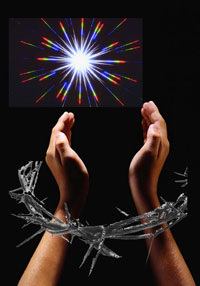Why is it so difficult to know God?
Question: Why do many intellectuals inquiring about God – be they scientists investigating his existence or historians of religion researching his ancient appearances – often fail to understand God properly?

The Bhagavad-gita (7.7) reveals that God in his highest aspect is a person, a living, loving person who reveals himself in reciprocation with our desire. Intellect-centric approaches overlook this essential personal reciprocal nature of God. Such approaches treat God either as a laboratory object for examination under a microscope, or as an archaeological artifact to be exhumed for investigation. Such exclusively or overly intellectual approach to know God can at best give some hints of his existence through scientific research of nature or of his appearances in ancient history, but all this is knowledge about God, not knowledge of God.
To better grasp this difference, let’s consider the example of a child who is taken for a health checkup to a diagnostic center. At the end of the check-up, the checkup incharge knows a lot about the child – the blood pressure, the heart beat, even the urine and stool compositions. He may probably know much more such details about the child than even the child’s mother, but who knows the child better? Obviously, the mother. If the checkup incharge approaches the child as a clinical object for investigation, then his very choice of approach depersonalizes the child to the level of a pathological object. On the other hand, the mother treats the child not as an object to investigate, but as a person to love. That’s why she knows the essence of the child – his likes and dislikes, his hopes and fears, his joys and sorrows. Put succinctly, she knows the child, whereas the checkup incharge knows about the child.
This principle of “what we want to see determines what we see” applies to God too. That’s why serious seekers don’t let the overly intellectual approach distract them from their purpose; they surely use their intellect – but for the purpose of deepening their love for God. The Gita declares that only by loving God that they can know him (4.3), and also that the true knower of God is the whole-hearted lover of God (15.19).
Thus, when it comes to God, by loving, we know; by knowing, we love. We know to love; we love to know. When we try to love and serve God, then we will discover that knowing him becomes easy, as is promised in the Gita (8.14). In essence, love is the key to the treasury and the treasury: love is the ultimate way to knowledge and love is the ultimate knowledge.
